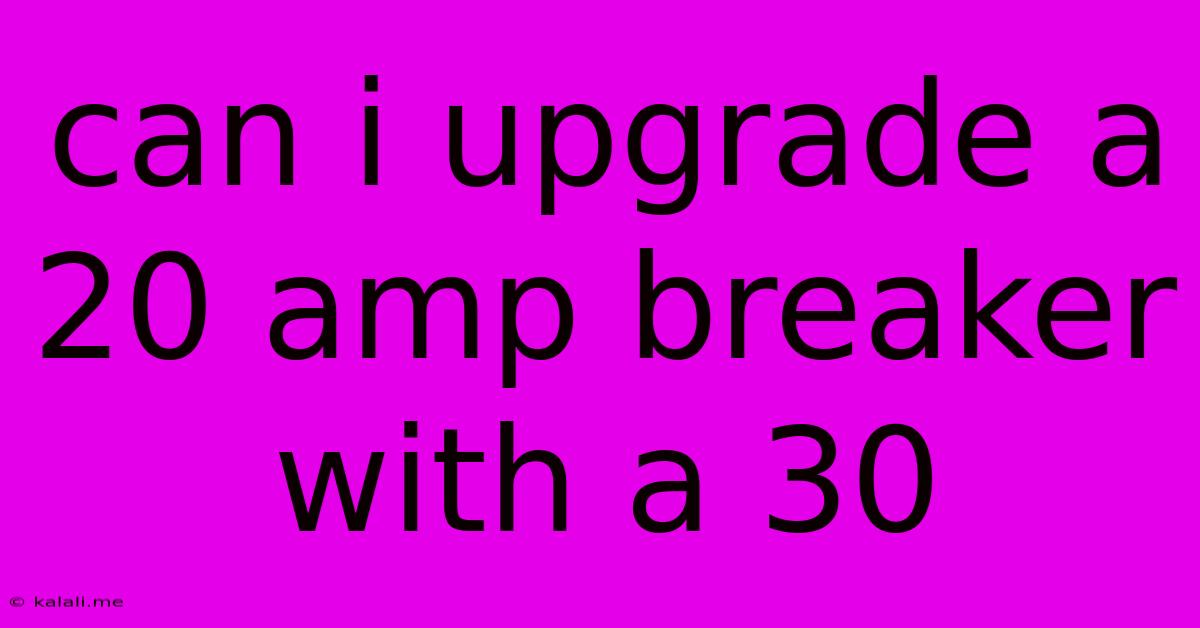Can I Upgrade A 20 Amp Breaker With A 30
Kalali
Jun 08, 2025 · 3 min read

Table of Contents
Can I Upgrade a 20-Amp Breaker to a 30-Amp? A Comprehensive Guide
Meta Description: Thinking about upgrading your 20-amp breaker to a 30-amp? This guide explores the safety implications, necessary steps, and potential pitfalls of this electrical upgrade. Learn when it's safe and when it's a bad idea.
Upgrading a breaker is a common question among homeowners looking to increase the power available to a circuit. While it might seem like a simple swap – just replace the 20-amp breaker with a 30-amp one – the reality is far more nuanced and involves several crucial considerations. Simply changing the breaker is rarely the correct solution and can be extremely dangerous.
This article will delve into the intricacies of upgrading a 20-amp breaker, exploring the circumstances where it might be appropriate (and more importantly, when it's absolutely not). We'll cover the potential hazards, necessary precautions, and the importance of consulting with a qualified electrician.
Understanding Amps, Breakers, and Circuits
Before diving into the upgrade question, let's clarify some fundamental electrical concepts. Amps (amperes) measure the amount of electrical current flowing through a circuit. A breaker acts as a safety device, interrupting the flow of electricity if the current exceeds its rated amperage to prevent overheating and potential fires. The wiring in your home is designed to handle a specific amperage. Using a higher-amperage breaker than the wiring can handle is a serious fire hazard.
Why You Shouldn't Just Swap a 20-Amp Breaker for a 30-Amp One
The most important thing to understand is this: a breaker is not a power upgrade. Increasing the breaker's amperage rating does not increase the power capacity of the circuit itself. The wiring is the limiting factor. If your circuit is wired with 12-gauge wire (designed for 20 amps), installing a 30-amp breaker won't magically give you more power. Instead, you'll overload the wiring, leading to overheating, potential melting of the insulation, and a significant risk of electrical fires. This is incredibly dangerous and could result in property damage or injury.
When a Breaker Upgrade Might Be Appropriate (with caveats)
There are extremely limited scenarios where increasing breaker amperage might be considered, but only after a thorough assessment by a qualified electrician:
- Wiring Upgrade: If your existing wiring is inadequate for your electrical demands, the solution is not to simply change the breaker. Instead, you must upgrade the wiring itself to a higher gauge (e.g., from 12-gauge to 10-gauge for a 30-amp circuit). This requires opening walls and ceilings, and is a significant undertaking. Only a licensed electrician should perform this work.
- New Circuit Installation: If you're adding a new circuit entirely, using thicker gauge wiring from the start (10-gauge for a 30-amp circuit, for instance) allows for a properly matched breaker. This is a far safer and more appropriate approach than attempting to retrofit an existing circuit.
The Safe and Correct Approach
Instead of considering a 20-amp to 30-amp breaker swap, focus on identifying the root cause of your electrical needs. If you're experiencing frequent tripping breakers, this indicates an overload on the existing circuit. Solutions include:
- Reducing the load: Unplug unnecessary appliances or spread the load across multiple circuits.
- Adding a new circuit: This involves running new wiring to handle the additional electrical load.
- Upgrading the wiring gauge: This involves replacing existing wiring with thicker, higher amperage rated wiring.
Always consult a licensed electrician before making any changes to your electrical system. They will assess your current wiring, determine the appropriate amperage, and ensure the upgrade is completed safely and according to code. Ignoring these warnings could have severe consequences.
In Conclusion
While the idea of simply swapping a breaker might seem tempting, it's a dangerous shortcut that should be avoided. Proper electrical work requires expertise and adherence to safety regulations. A licensed electrician will diagnose the problem and implement the correct solution, ensuring the safety of your home and family. Prioritize safety over convenience; it's always worth it.
Latest Posts
Latest Posts
-
What Time Is It In Japanese Language
Jun 08, 2025
-
How To Finish A Formal Letter
Jun 08, 2025
-
Why Do Fruits Taste Bland When Not In Season
Jun 08, 2025
-
Is A Linear Equation Always A Stright Line
Jun 08, 2025
-
What Does Black Is The New Orange Mean
Jun 08, 2025
Related Post
Thank you for visiting our website which covers about Can I Upgrade A 20 Amp Breaker With A 30 . We hope the information provided has been useful to you. Feel free to contact us if you have any questions or need further assistance. See you next time and don't miss to bookmark.